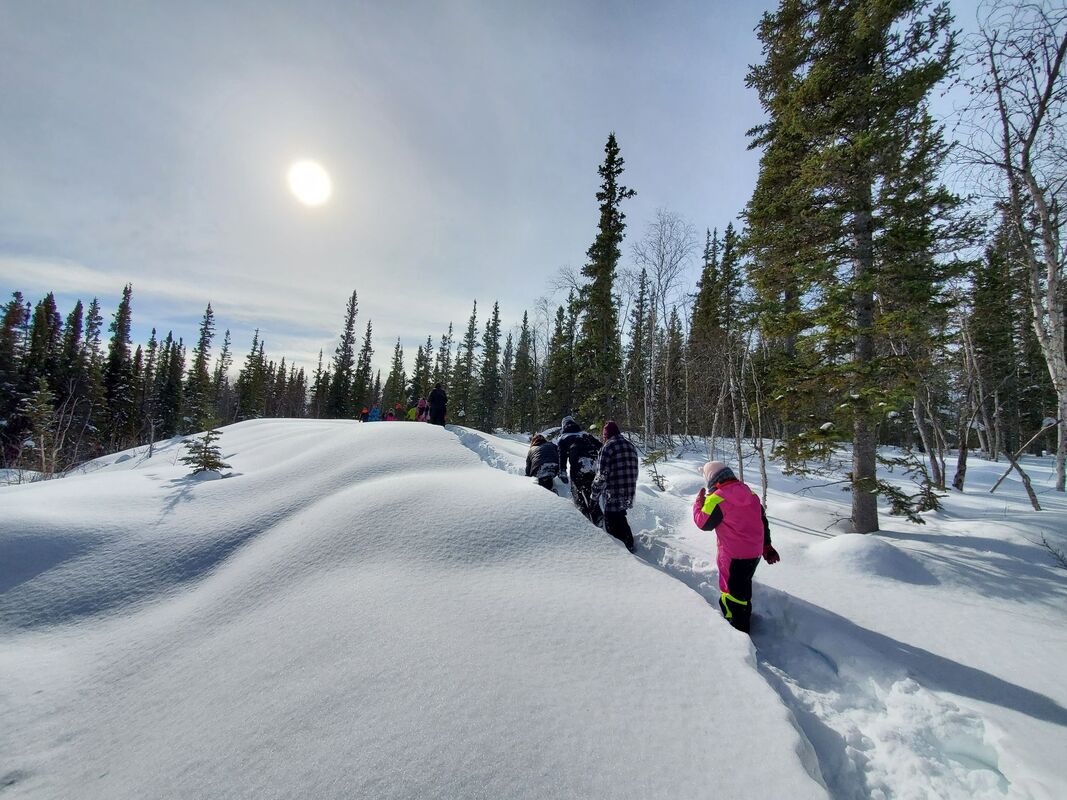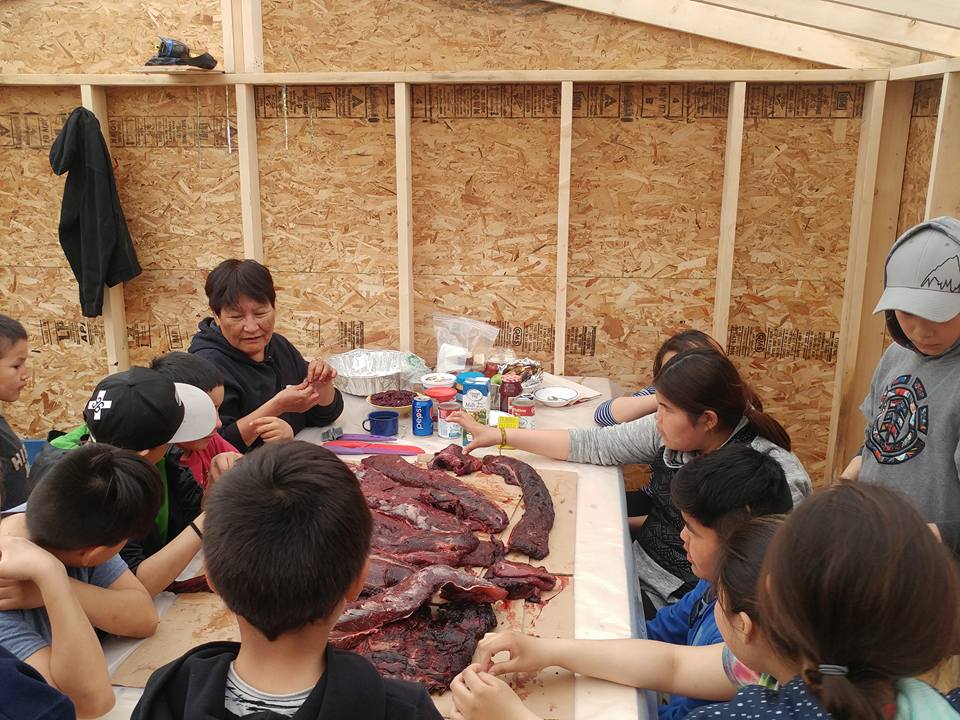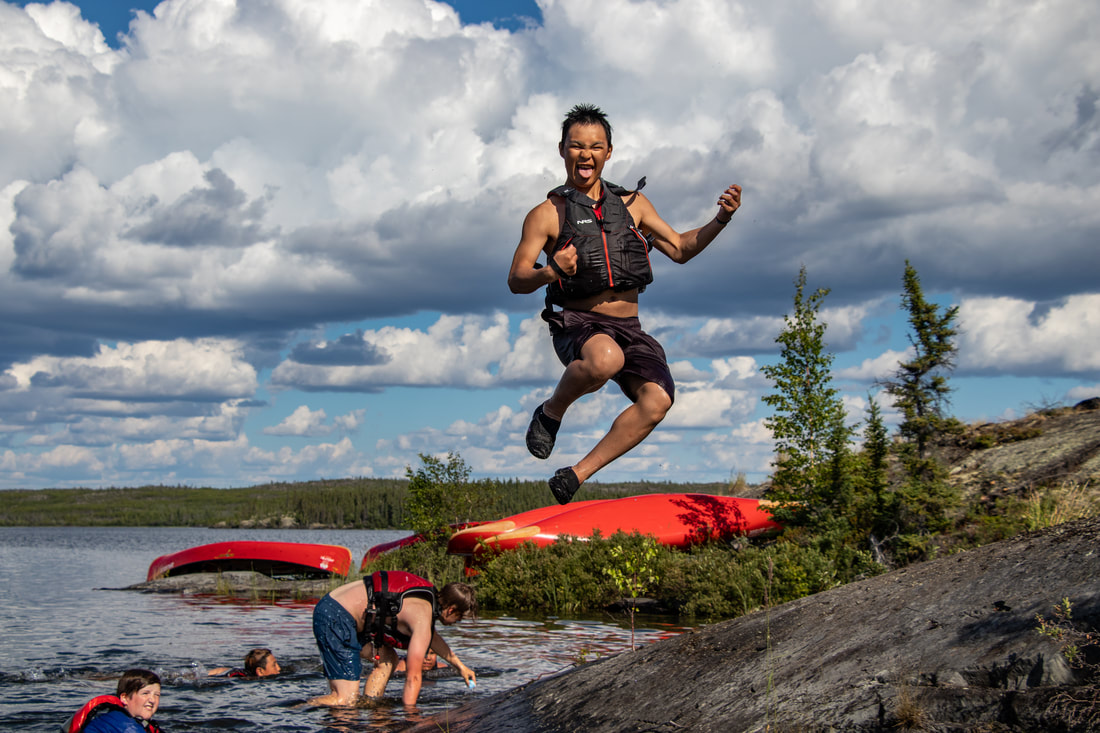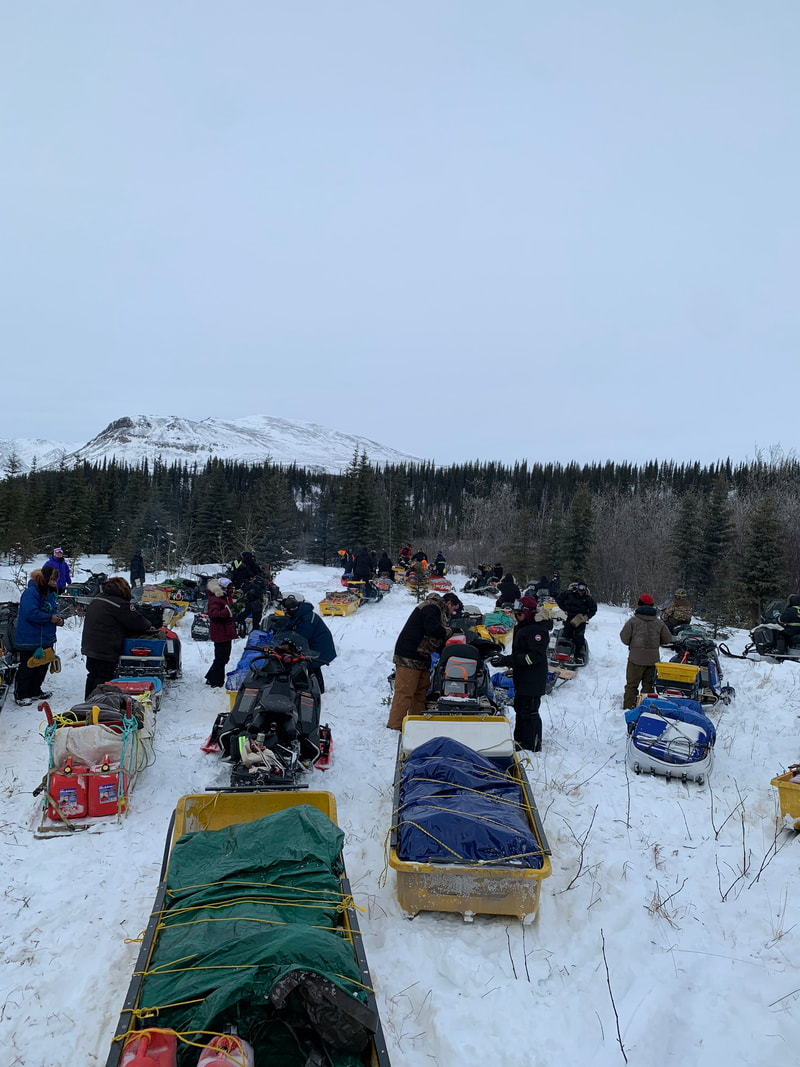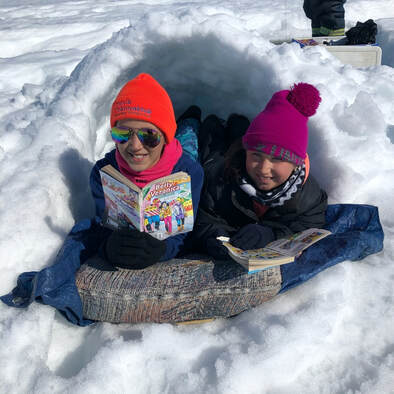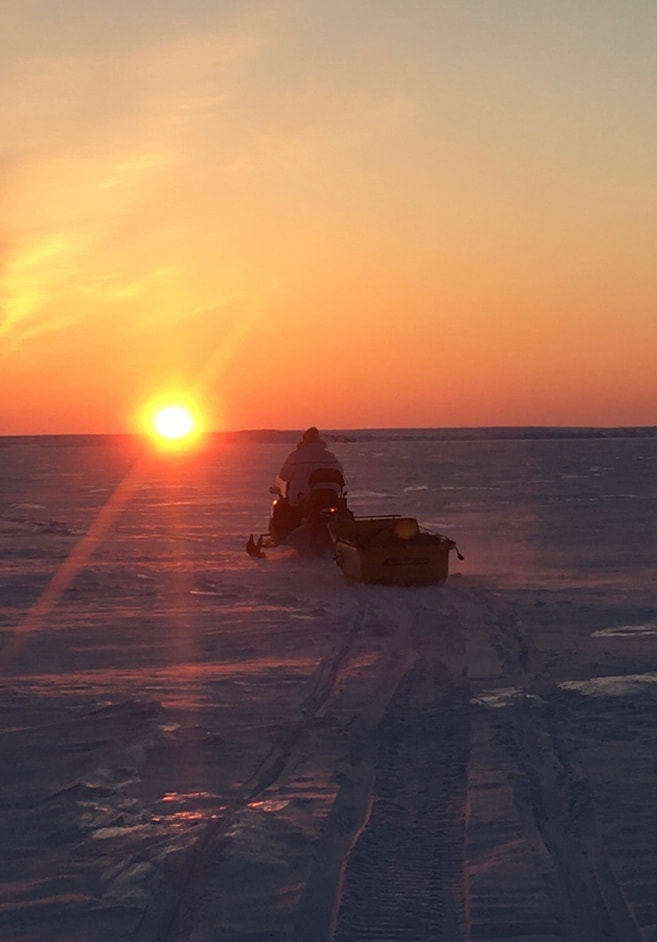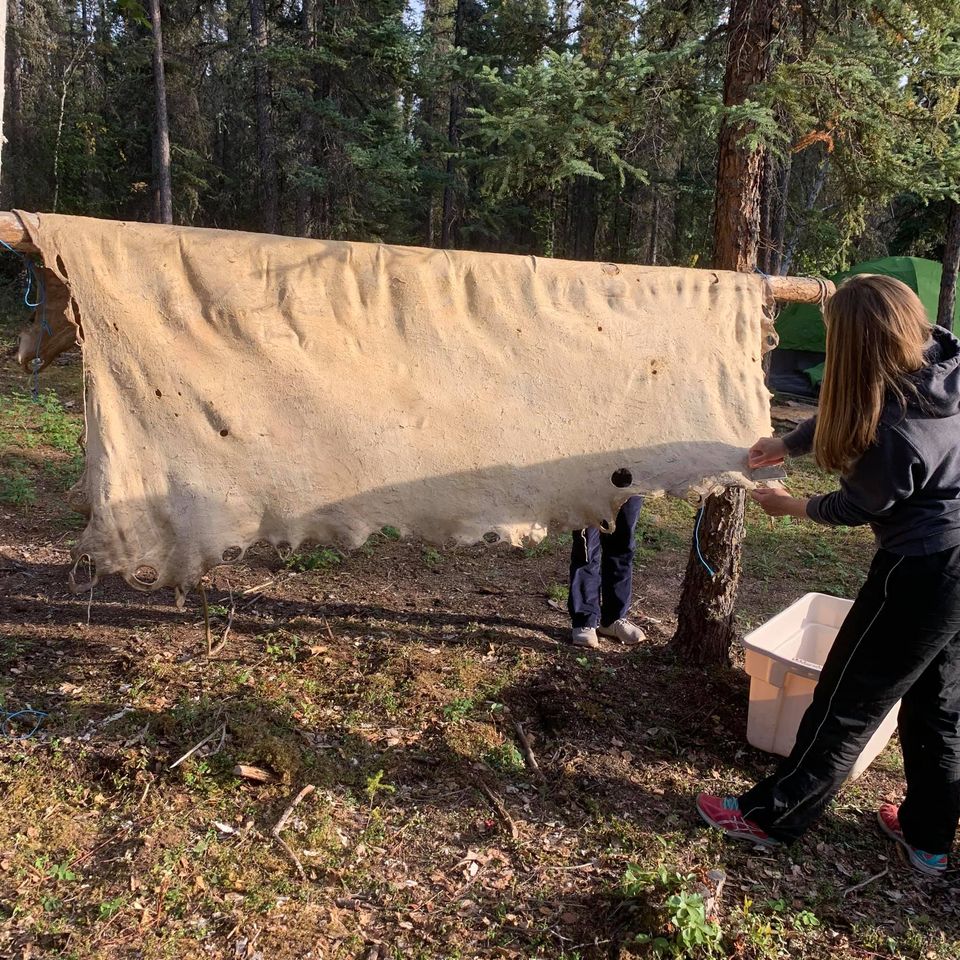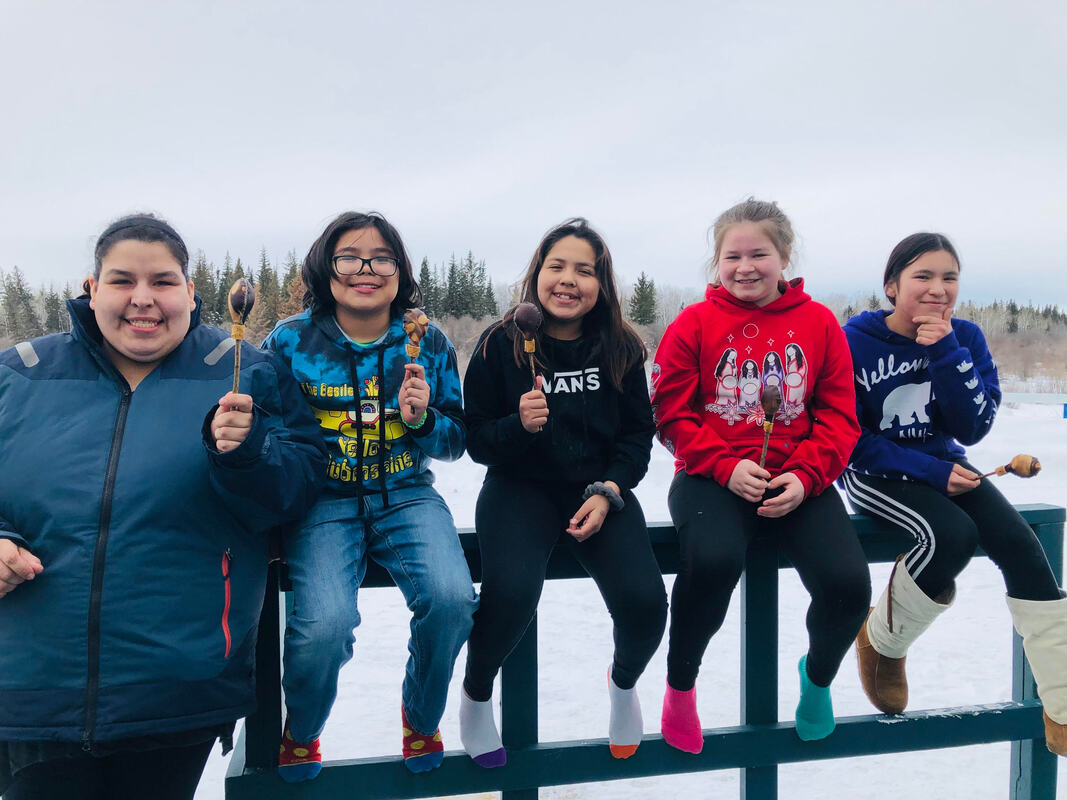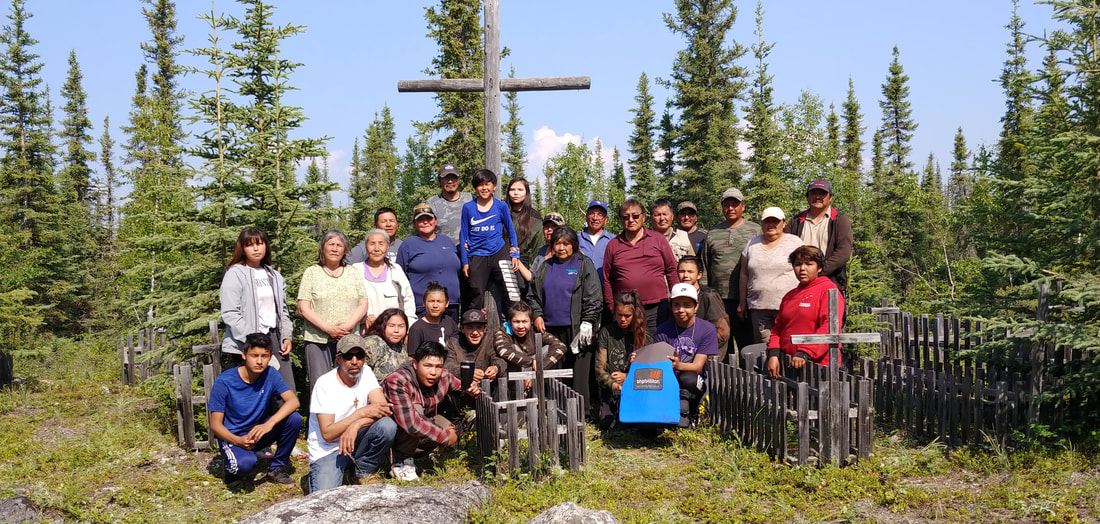NWT: On the Land Day Trips
Description: The YWCA’s GirlSpace and Dudes Club programs organized three land-based programs for youth: adventure culture camp, dog sledding, and laughing lichen workshops. The adventure culture camp gave 21 youth the opportunity to snowmobile, check the fish net, and clean and cook fish over a fire at B Dene Adventures. By following the Dene laws, the participants learned to show respect to Elders and knowledge holders. Next, 21 participants went dog sledding to a traditional trapper’s cabin where the participants learned about Indigenous modes of transportation. GirlSpace members participated in Laughing Lichen workshops where they explored their creativity and learned new skills for harvesting botanicals and creating their own natural personal care products.
Successes: The youth were able to connect with Indigenous history and culture of the territory that they live on. In the past, participant levels have been an issue, but these programs had full attendance. The participants had a lot of fun at the adventure camp and asked when they will get to do some of the activities again. At the dog sledding event, some of the youth who were afraid of the dogs at the start were petting them by the end, and gained a respect for the dogs and their hardworking nature.
Akaitcho: Back to Culture and Traditions
|
Description: Despite COVID-19 and the uncertainty that came with it, students of Łútsël K’é Dene School were able to get out on the land for various activities. Students in grades six to nine learned how to put up a teepee. They learned about the type of wood needed for the poles, how to prepare the poles, and then put the teepee in place. During another outing, students participated in Dene games. They learned the how-to of each game from community members and Elders then practiced them on their own. In the fall, students attended the annual culture camp where they were taught how to filet fish and practiced fileting their own fish. Afterwards, they could cook it or bring it home to their families.
Successes: At first many students didn’t want to touch the fish, but once they got their hands in there, they ended up enjoying themselves. In addition, sometimes the school struggles to get older youth to join the culture camp, however, by talking about the importance of the camp, most of them joined this year. Lastly, community members joined the culture camp to help out or just spend time on the land with the students. The community members, including Elders, share teachings to the students through storytelling.
|
Objective: For students to learn many valuable on the land and traditional skills, and to continue to deliver land-based programs for the students. |
Dehcho: Paddling Leadership Program
Description: Ten youth from the Dehcho participated in a twelve day canoe trip of the Pensive Lake loop organized by Łı́ı́dlı̨ı̨ Kų́ę First Nation. Participants met and completed much of the journey together; learning team-building skills and forming new friendships as they faced the challenges of many portages and paddling/weather conditions together. Not only did they complete the trip, but they also received Paddle Canada certifications, learned survival skills, and built leadership skills. Canoeists set up and took down camp every day and participated in every aspect of the trip, including cooking meals.
Successes: The group completed the trip safely with no injuries or health issues. The participants rose to the occasion and overcame many physical challenges while canoeing and portaging (over 20 portages). Experiences like this strengthen confidence and resilience which will have ripple effects in the Dehcho communities.
Successes: The group completed the trip safely with no injuries or health issues. The participants rose to the occasion and overcame many physical challenges while canoeing and portaging (over 20 portages). Experiences like this strengthen confidence and resilience which will have ripple effects in the Dehcho communities.
Gwich'in: Historical Trails
,Objective: To teach young people and families how to cut historical trails, and how to butcher caribou and understand what each part is used for with the Gwich'in language integrated throughout. Description: Fifteen community residents of Teet’łit Zheh/Fort McPherson and Old Crow learned about the trails that were used and traveled on for hundreds of years by their ancestors. This trip was led and organized by Philip Joseph Kaye with the support of Teet’łit Gwich’in Band Council. During the trip, caribou were harvested and the participants learned how to hunt and field dress a caribou. Participants were engaged in all aspects of camp, including chopping wood and setting up camp. Knowledge holders shared old time stories about how their ancestors used to travel and harvest on the land. Throughout the trip, knowledge holders passed on the knowledge of the trails which will have long-term benefits for the community as they will be able to pass down the knowledge to future generations.
Successes: Everyone worked together on the caribou. The young people learned how to field dress a caribou and how to use each part so that no parts of the caribou are wasted. While travelling, the group had perfect weather.
|
Inuvialuit: Literacy & Land
Objective: To promote a love of reading and learning by immersing youth in on the land activities that incorporate culture, Elder interactions, and survival skills so that students will return to school better prepared and eager to learn. Description: Working with six communities in the Inuvialuit Settlement Region, participants enjoyed tailored day trips according to the strengths and needs of each community. The Inuvialuit Regional Corporation partnered with local schools to seek out which on the land programming would be suitable for them and their youth in this uncertain time. In Akłarvik/Aklavik, Moose Kerr School students attended a rites of passage program that included discussions on knowing self in place, culture, family and community, personal values, and family values through wellness and spiritual awareness. Further activities included setting traps, gathering wood and building shelters. At Mangilaluk in Tuktuuyaqtuuq/Tuktoyaktuk, students participated in northern games clinics, igloo building, and a pingo picnic. In Uluksaqtuuq/Ulukhaktok, there were three different trips: ocean-seal hook making, survival skills, and a muskox harvest.Youth learned to make their own seal hooks, travel and prepare for elements and safety apparatuses necessary for being on the land, and see the responsibilities, work, and patience required to hunt. In Ikaahuk/Sachs Harbour, there were two cultural camps for youth planned that involved fishing, hunting, and teaching and exploring traditional skills. Participants learned to prepare meat and work on hides. In Inuuvik/Inuvik, there were various day trips bringing students on the land to share knowledge, skills and proper techniques on hunting and trapping game during the winter and spring seasons. In Paulatuuq/Paulatuk, youth enjoyed several day trips where the youth were able to engage in multiple activities and learn to prepare food while on the land. The youth felt excitement and pride in preparing fish that was caught by themselves.
Successes: Many youth that participated in these programs would not have otherwise been given the opportunity to spend time on the land to learn skills and build positive rapport with other youth. By providing students with these opportunities, it strengthens their connection to the land, people, wildlife, and self. With the looming effects of COVID-19, the restrictions put a limitation on community gatherings, harvest, and events that bring people together from all across the region. As a result, resiliency of community members and youth has shined through seeking alternative ways to connect and engage in culturally relevant activities.
|
Sahtú: Rádeyı̨lı̨kóé Hide Camp
Objectives: To teach and build upon the skills of preparing and tanning harvested hides, as well as cultural practices of handling harvested foods and medicine from the land with language intertwined. |
Description: Yamoga Land Corp’s hide camp brought together hide workers, Elders, camp workers, administrators, organizations, and visitors to teach and build upon the skills of preparing and tanning harvested hides. Hide workers gained skills and Indigenous knowledge for animal hide work processes on the land. At this year’s camp, hide workers learned to dehair, flesh, strain the blood, soften, and store the hide. Participants also learned to prepare the hide for tanning. Furthermore, the learners learned the cultural practices about respecting the animal and the land. Elder hide teachers gained respect for the young people who worked on hides and the young camp workers. They were amazed at the eagerness to learn by the young people. Elder visitors enjoyed observing young people working hard to learn traditional practices and it lifted their spirits. They felt proud of the young people.
Successes: The organization and community were pleased with the outcome of the camp. There was a sense of pride from everyone who visited or participated at the camp. Many people prepared and worked on hides prior to camp and after camp ended. One participant continued to work on her hide and completed tanning the hide after camp finished. Some started new hides to prepare for storage. Yamoga Land Corp learned that partnering with other community organizations creates a positive project outcome for the whole community.
|
South Slave: Youth Culture Camp
Objective: To bring Indigenous youth on the land so that they can connect with land, culture, water and each other with local knowledge keepers.
Description: In March, Uncle Gabe’s Friendship Centre held a youth culture camp at Tthebacha Salt River in the Métis cabins. Through this camp, Indigenous youth learned traditional land-based skills while reconnecting with themselves, the land, and their peers through games, workshops, traditional teachings and local knowledge holders. At the camp, participants enjoyed nail pounding competitions, preparing traditional meals, cultural nature walks, games, storytelling, and painting. In addition, the participants learned to make moose hide rattles, do beaded edging on moose hide, cultural teachings about using what we need from the land without ruining the integrity of the forest, how to build a lean-to, and how to make bannock on a stick. Anna Coleman, the Elder at Uncle Gabe’s Friendship Centre, came to camp, and drummed and sang a prayer song. She explained to the youth about the prayer, what to ask for and how to do so with good intentions by offering tobacco. She also taught the youth about tea dances and explained it is called a tea dance. The youth danced as she drummed. The youth also participated in a self-esteem canvas.
Successes: The culture camp provided local community members the opportunity to share their knowledge, and the local youth an opportunity to receive these valuable teachings. The workshops provided the youth with skills and knowledge that can be carried and passed onto future generations. At the camp, the youth worked together as a team to haul gear, encourage each other in workshops, build a lean-to, and cook for others. Many participants eagerly asked when the next cultural camp would happen because they enjoyed it so much.
Tłı̨chǫ: Whatì Annual Boat Trip
|
Description: In early September, 37 youth, Elders, and local harvesters spent 10 days on the Whatì Community Justice Program’s annual boat trip around the lakes of Whatì. Since early 1980, Whatì Elders went around Whatì annually to repair fences of their buried relatives around the lake. This trip engaged youth, and Elders passed on Indigenous knowledge, bridging generational gaps. For the safety of all that participated, agreements and rules were set to ensure that participants followed traditional values, customs, and expectations for an optimal learning experience on the land. The youth had an opportunity to learn how to harvest a caribou, make drymeat, and cook over the fire. Youth learned about honoring the traditional burial sites, and repaired gravesites and paid their respects. Elders shared stories of their ancestors, and taught youth how and why it is important to honour our ancestors.
|
Successes: This trip is important to Whatì youth as it builds character, independence, basic life skills, teamwork, and self-confidence. During the trip, the participants were able to harvest a caribou. Gravesites around Whatì were repaired.
|
